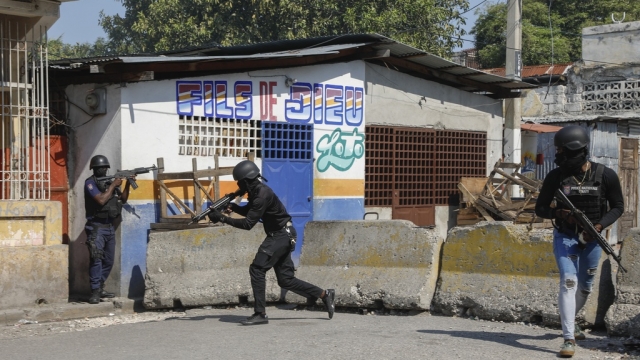One constant in recent years for Haiti's internal security environment has been its deterioration. What has been described as growing gang violence has wreaked havoc on swaths of the country, and is increasingly spreading to areas where people previously fled to escape the danger.
This week a proposed plan to install new leadership in the Caribbean island nation failed after political parties rejected the idea of creating a presidential council to manage a transition and select an interim prime minister, and a council of ministers to form a new route forward for the country.
Haiti's turmoil was only made worse after the assassination of its President Jovenel Moïse in 2021, sparking a worsening constitutional crisis there.
On Thursday the U.S. Senate overwhelmingly voted to confirm diplomat Dennis Hankins to the post of ambassador to Haiti, filling the position for the first time in nearly 2 1/2 years. Hankins will travel to Port-au-Prince to work on trying to sort out years of political and social upheaval.
SEE MORE: Americans looking to escape violence in Haiti fear there is no way out
In 2019, the United Nations ended a 15-year peacekeeping mission in Haiti that began after the ouster of President Jean-Bertrand Aristide in 2004. Thousands and thousands of international NGOs had been giving foreign aid to the country to support its social service needs, but the end of the U.N. mission dissolved much of those aid efforts causing even more strife for the small nation located under 1,000 nautical miles from Florida's shores.
This week, Florida's Gov. Ron DeSantis ordered additional personnel and assets to deploy to the southern border of the state to assist in preparing for a "potential influx of illegal immigration from Haiti."
A statement from the governor's office read, "For quite some time, the State of Florida has been dedicating significant resources to combat illegal vessels coming to Florida from countries such as Haiti."
DeSantis said, "Given the circumstances in Haiti, I have directed the Division of Emergency Management, the Florida State Guard, and state law enforcement agencies to deploy over 250 additional officers and soldiers and over a dozen air and sea craft to the southern coast of Florida to protect our state."
Earlier in the week Secretary of State Antony Blinken said the U.S. would provide $33 million in additional humanitarian aid for Haitian civilians. The State Department said that organized criminal groups have escalated violence since Feb. 29, causing people to be displaced on the island, struggling to get access to health care, water, hygiene facilities and food. The U.S. called the situation dire.
Haiti's de facto Prime Minister Ariel Henry traveled to Nairobi, Kenya in late February to negotiate a plan to have a new U.N.-authorized security support mission serve to help quell Haiti's out-of-control violence.
Logistics are also being worked out to form an air bridge on Haiti's border with the Dominican Republic that the U.N. said would allow aid and service to safely get into Haiti. The White House said it was considering a plan to use Guantanamo Bay, situated on the island of Cuba, to help process an influx of Haitians as they flee widespread gang violence.
Americans in Haiti have been looking for weeks for ways to escape the country after airports closed down and armed gangs roam streets amid unrest.
American missionary Jill Dolan said, "We hear a lot of gunfire, generally at night. We hear a lot." Dolan became trapped in the country with her family as they hid in a guest house near an airport.
A report from Foreign Policy called the line between determining what is described as organized crime and an insurgency "murky," but wrote both use violence to take control. The report said policymakers are hesitant to label the cause of the violence in Haiti as a criminal insurgency, perhaps because of a lack of stated political goals or an understanding of if the violence is caused by groups just looking to generate income.
William O'Neill, the U.N.'s independent expert on human rights in Haiti said, "My concern is that the longer there is a power vacuum and an effort to figure out a way forward on the political side, every day that delays resolutions, many, many people are dying."
He called the situation "absolutely catastrophic," and said, “I describe Port-au-Prince now as an open-air prison. There is no way to get out. Land, air or sea. The airport is still not functioning."
Trending stories at Scrippsnews.com




